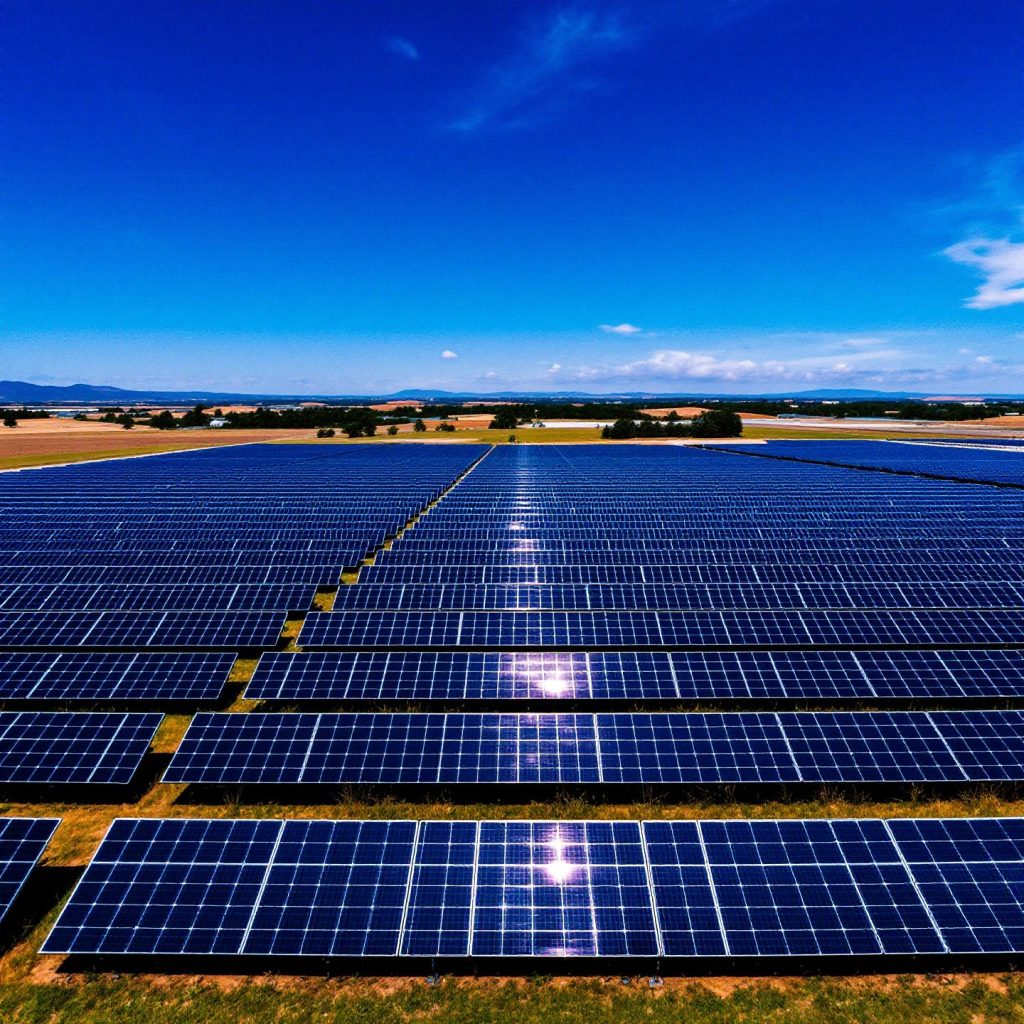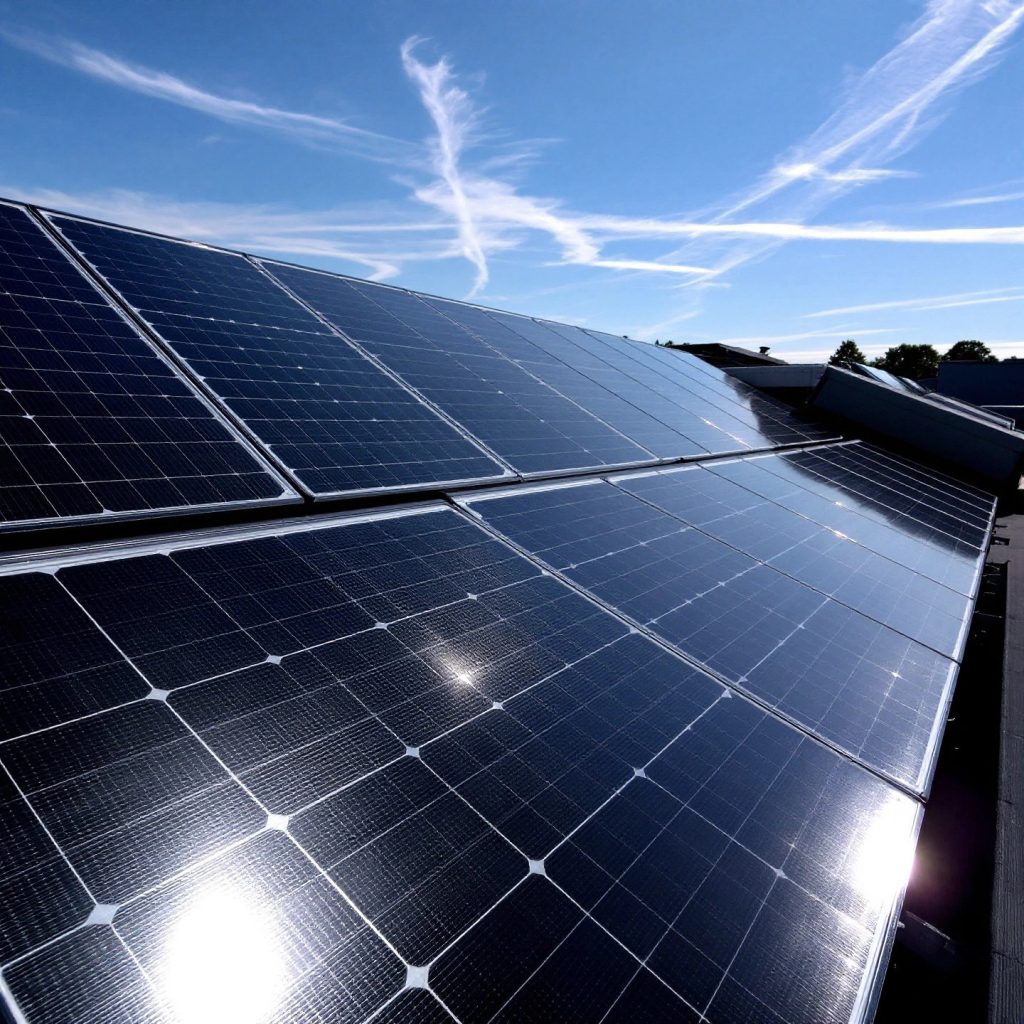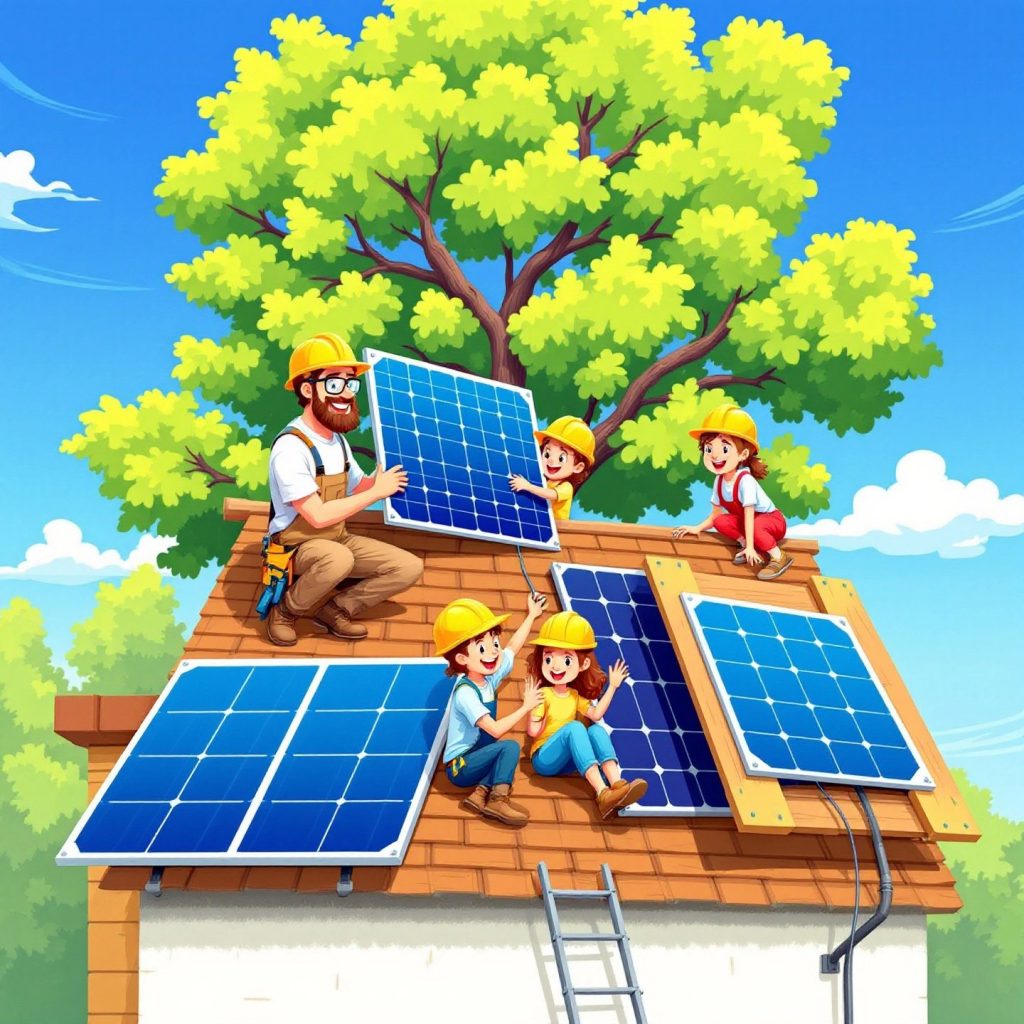Introduction to Solar Panel Cleaning Service
Imagine investing in a solar energy system only to find out that its performance dwindles due to overlooked maintenance. This is where a solar panel cleaning service becomes essential. Regular cleaning is crucial for maintaining the efficiency and longevity of your solar panels. Dust, debris, and environmental contaminants can accumulate over time, reducing your panels’ ability to absorb sunlight effectively. This can lead to a significant drop in energy output, ultimately affecting your savings on electricity bills.
Professional solar panel cleaning services play a pivotal role in ensuring your solar panels operate at their peak performance. These services not only enhance energy efficiency but also extend the lifespan of your panels. According to EnergySage, cleaning your panels can increase their efficiency by up to 7% in areas prone to dust and grime buildup. This improvement translates into more energy production and greater financial returns on your solar investment.
While it might be tempting to clean the panels yourself, hiring professionals offers distinct advantages. As noted by Squeegee Squad, professional cleaners possess the expertise and equipment necessary to clean panels without causing damage. They use eco-friendly solutions and purified water to prevent mineral buildup, ensuring a streak-free finish. Moreover, professionals can identify potential issues, such as micro-cracks or wear and tear, that may not be visible to the untrained eye.
In summary, a solar panel cleaning service is not just about keeping your panels spotless; it’s about maximizing energy efficiency and protecting your investment. By ensuring your panels are clean and well-maintained, you can enjoy optimal performance and extended panel life, leading to increased energy savings and reduced environmental impact.
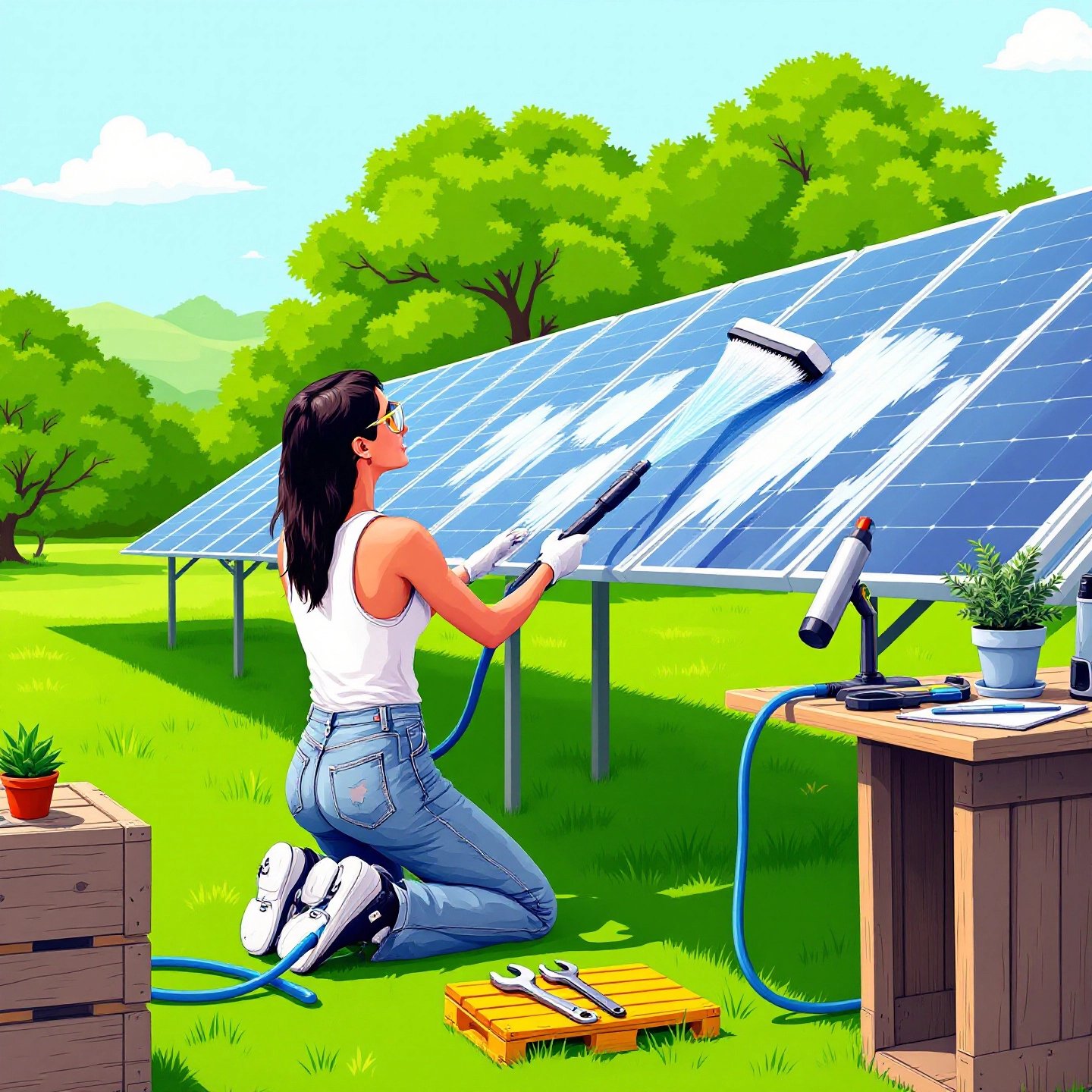
Understanding the Basics of Solar Panel Maintenance
When you invest in solar panels, maintaining them becomes crucial to ensure they operate at their best. Sounds complex? Not at all! Solar panel maintenance is relatively straightforward, requiring minimal effort to keep your system running efficiently. Routine solar panel care involves regular checks to prevent dust, debris, and environmental buildup, which can hinder energy production.
Imagine your solar panels as a window to the sun’s energy. Over time, this window can get dirty, reducing the amount of sunlight that reaches the solar cells. This is where solar panel maintenance comes into play. Regular upkeep practices can significantly improve your panels’ performance and longevity.
Routine Maintenance vs. Deep Cleaning
Routine maintenance focuses on simple tasks that prevent buildup and ensure optimal performance. This includes:
- Daily Checks: A quick visual inspection to ensure no obvious debris or obstructions are present.
- Weekly Cleaning: Use a garden hose to gently rinse off any accumulated dust or pollen.
- Monthly Inspection: Check for any signs of damage or persistent dirt that might require deeper cleaning.
Deep cleaning, on the other hand, is more thorough and less frequent. It involves using specialized tools and solutions to remove stubborn grime and ensure the panels are spotless.
Preventive Measures and Environmental Considerations
Solar panels are designed to withstand various weather conditions, but certain environments may require extra attention. For instance, if you live near a busy road or industrial area, your panels might accumulate more dirt and require more frequent cleaning. In contrast, panels in rural areas might benefit from natural rainfall that washes away dust.
To maximize efficiency, consider the following preventive measures:
- Trim overhanging branches to reduce leaf and bird dropping accumulation.
- Use critter guards to prevent animals from nesting under the panels.
- Install a monitoring system to track energy output and identify when cleaning is necessary.
By incorporating these simple yet effective practices into your solar panel maintenance routine, you’ll notice a significant boost in energy efficiency and ensure your investment continues to pay off for years to come. Next, we will explore how to identify when your panels need a thorough cleaning to maintain their optimal performance.
Identifying When Your Panels Need a Thorough Cleaning
Imagine glancing at your energy bill and noticing an unexpected spike. Could it be that your solar panels are not performing at their best? This is where understanding solar panel cleaning indicators becomes crucial. Knowing when to clean your solar panels is essential for maintaining their efficiency and ensuring they provide maximum energy output.
Performance Indicators to Watch For
Several key indicators can help you determine when your panels require a thorough cleaning:
- Reduced Energy Output: A noticeable drop in energy production is one of the most telling signs. Monitor your system’s output through your solar monitoring app or electricity bill. If you see a decline, it might be time to inspect and clean your panels.
- Visible Grime and Debris: Conduct regular visual inspections. If you notice a layer of dirt, bird droppings, or leaves, it’s a clear sign that cleaning is necessary.
- Seasonal Factors: Depending on the season, your panels may collect more debris. For instance, pollen in spring or ash from wildfires in summer can accumulate quickly.
Location and Environmental Impact
The frequency of cleaning largely depends on your location and environmental conditions. Here’s how different settings can affect your cleaning needs:
| Location Type | Common Conditions | Cleaning Frequency |
|---|---|---|
| Urban Areas | High pollution, smog, dust | Frequent cleaning needed |
| Desert Regions | Dust storms, minimal rainfall | Regular cleaning required |
| Wooded Areas | Leaves, bird droppings | Seasonal cleaning advised |
| Industrial Zones | Industrial residue, pollutants | Frequent cleaning needed |
According to WattUp, solar panels in polluted urban environments or dusty desert regions need more frequent cleaning compared to those in areas with regular rainfall. This is because pollutants and dust can create a layer on the panels, significantly reducing their efficiency by up to 20%.
By keeping an eye on these indicators and understanding the impact of your location, you can effectively determine when to clean solar panels to maintain their optimal performance. Next, we will delve into the differences between residential and commercial solar panel cleaning needs, providing insights into tailored cleaning strategies for each.
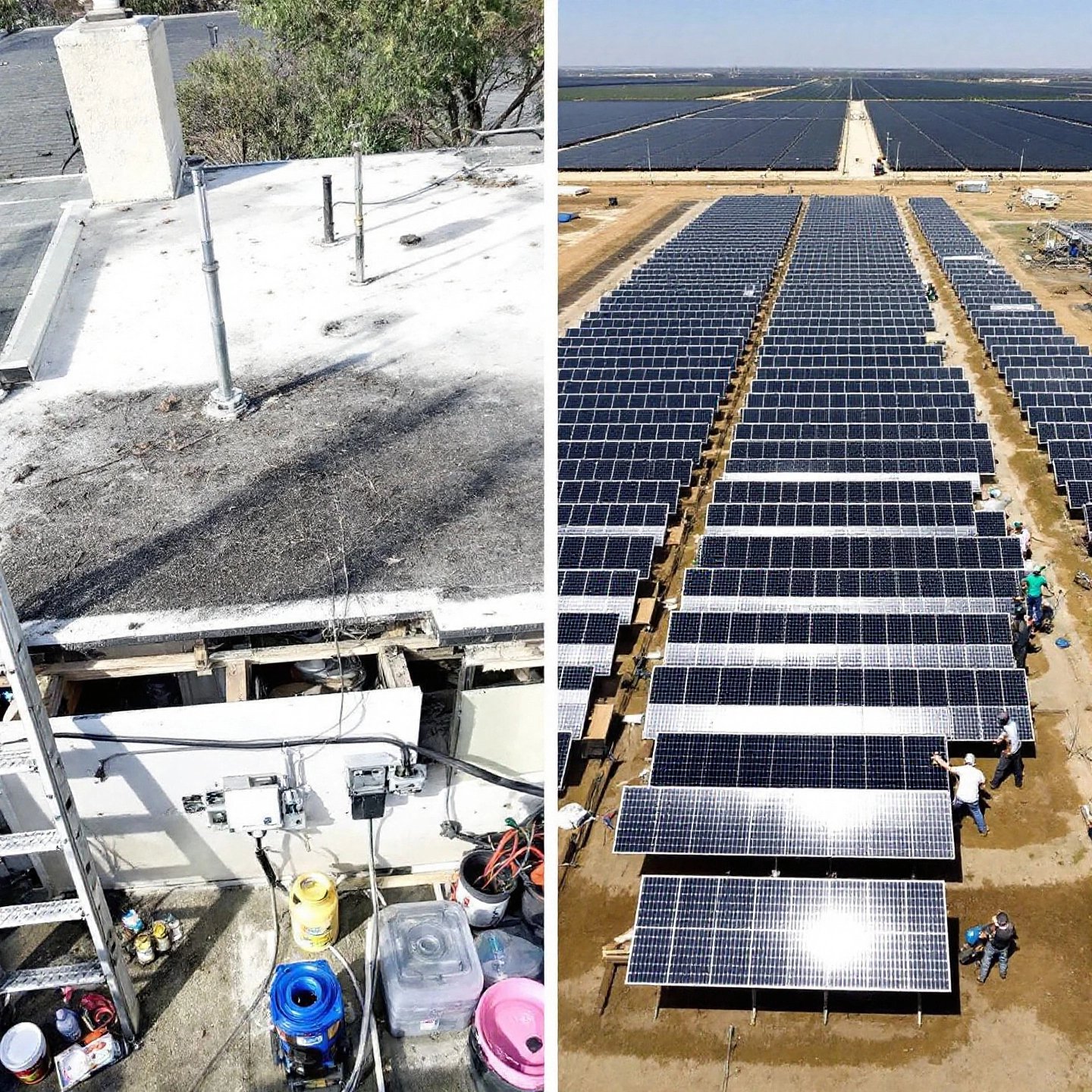
Comparing Residential and Commercial Service Requirements
When it comes to maintaining solar panels, the needs for residential solar panel cleaning and commercial solar panel cleaning differ significantly. Understanding these differences is crucial for ensuring that each type of installation receives the appropriate care to remain efficient and effective.
Scale and Complexity
Residential solar panel systems are typically smaller and less complex, often installed on rooftops of homes. This makes them easier to access and clean with simple manual methods. In contrast, commercial solar panel setups are usually larger, sometimes spread across multiple locations or vast solar farms. These require more sophisticated cleaning techniques and equipment, often involving automated or robotic systems to handle the extensive and hard-to-reach arrays.
Frequency and Safety Protocols
The frequency of cleaning also varies. Residential panels may only need cleaning once or twice a year, depending on environmental conditions. However, commercial panels, due to their larger scale and potential exposure to more pollutants, often require more frequent cleaning schedules to maintain optimal efficiency. Safety protocols are another consideration; while residential cleaning might involve standard safety measures, commercial cleaning often requires advanced safety equipment and procedures, especially when dealing with installations at height or in remote locations.
Cost Considerations
The cost of cleaning services also differs between residential and commercial panels. Residential cleaning is generally less expensive, given the smaller scale and simpler logistics. On the other hand, commercial cleaning can be costlier due to the need for specialized equipment and the larger scale of operations. However, investing in regular cleaning can prevent efficiency losses and extend the lifespan of the panels, ultimately providing financial benefits in the long run.
Introducing Renewable Energy Nexus Solutions
For both residential and commercial setups, Renewable Energy Nexus offers tailored solar panel solutions that cater to the specific needs of each type of installation. From flexible portable panels ideal for residential use to robust bifacial models for commercial applications, Renewable Energy Nexus provides a range of products designed to maximize efficiency and ease of maintenance. Their expert guidance ensures that whether you’re managing a small home system or a large commercial array, your solar panels are always performing at their best.
Understanding the unique requirements of residential and commercial solar panel cleaning helps in making informed decisions about maintenance strategies. By choosing the right approach and products, you can ensure that your solar panels deliver maximum efficiency and longevity, regardless of their scale or complexity. In the next section, we will explore the cost factors associated with different cleaning options, providing insights into how to budget effectively for solar panel maintenance.
Exploring Cost Factors for Different Cleaning Options
When considering the maintenance of your solar panels, understanding the solar panel cleaning cost is crucial for budgeting and maximizing your investment. The costs can vary significantly based on several factors, including your geographic location, the size of your system, and the frequency of cleaning required.
Regional Variations in Pricing
Geographic location plays a significant role in determining cleaning costs. For instance, areas with higher labor rates or limited availability of skilled professionals might see higher prices. According to EcoFlow, the average cost ranges from $8 to $25 per panel, translating to roughly $150 to $300 per visit for a typical residential system. In contrast, regions with a competitive market may offer lower rates due to increased service availability.
System Size and Complexity
The size and complexity of your solar panel system also affect the overall cost. Larger systems with more panels will naturally incur higher cleaning costs, but many service providers offer discounts for bulk cleaning. As noted by HomeGuide, cleaning costs range from $10 to $20 per panel, with most homeowners spending around $325 in total. Additionally, complex installations, such as those on steep roofs or with intricate wiring, may require more time and specialized equipment, increasing the cost.
| System Size | Estimated Cost Range |
|---|---|
| Small (up to 10 panels) | $100 – $200 |
| Medium (11-20 panels) | $200 – $400 |
| Large (21+ panels) | $400 – $600+ |
Additional Charges and Considerations
Beyond basic cleaning fees, several additional factors can influence the final price. For example, if your panels are particularly dirty or have not been cleaned in a while, the service might require extra time and effort, leading to higher costs. Safety measures for cleaning panels on tall or steep roofs can also add to the price. Furthermore, some companies offer package deals that include regular inspections or maintenance services, which might be more cost-effective in the long run.
Understanding these cost factors can help you make informed decisions about maintaining your solar panels. By planning your cleaning schedule and considering regional and system-specific variables, you can ensure that your panels remain efficient and your investment continues to yield returns. Next, we will discuss how to find local providers for quick and efficient cleaning services, ensuring your panels are always in top condition.
Finding Local Providers for Quick and Efficient Service
When it comes to maintaining the efficiency of your solar panels, finding a reliable local provider can make all the difference. Searching for a solar panel cleaning service near me not only ensures timely service but also supports local businesses. Here’s how you can effectively find solar cleaning service providers in your area.
Optimizing Local Searches
Start by using search engines to look for local solar panel cleaning services. Typing in your location along with the service you need, such as ‘solar panel cleaning service in [Your City]’, can yield targeted results. Websites like Angi offer a platform to connect with top-rated local professionals based on verified reviews and ratings.
Verifying Credentials and Reading Reviews
Once you have a list of potential providers, the next step is to verify their credentials. Ensure they hold necessary certifications and insurance, which can be confirmed through platforms like LinkedIn or by checking their website for affiliations with organizations such as the Solar Energy Industries Association (SEIA). Reading customer reviews on platforms like Yelp or Google can provide insights into their reliability and quality of service. Look for consistent positive feedback regarding punctuality, professionalism, and effectiveness.
Scheduling Site Assessments
Before making a final decision, consider scheduling a site assessment with a few shortlisted providers. This allows them to evaluate the condition of your panels and provide a detailed quote. During this visit, ask questions about their cleaning methods, safety protocols, and any warranties they offer. A reputable service will be transparent about their processes and costs, ensuring you feel confident in your choice.
By following these steps, you can find a local solar panel cleaning service that meets your needs and ensures your panels are operating at peak efficiency. In the next section, we’ll explore the professional equipment and techniques used in solar panel cleaning, highlighting how they contribute to maintaining optimal panel performance.
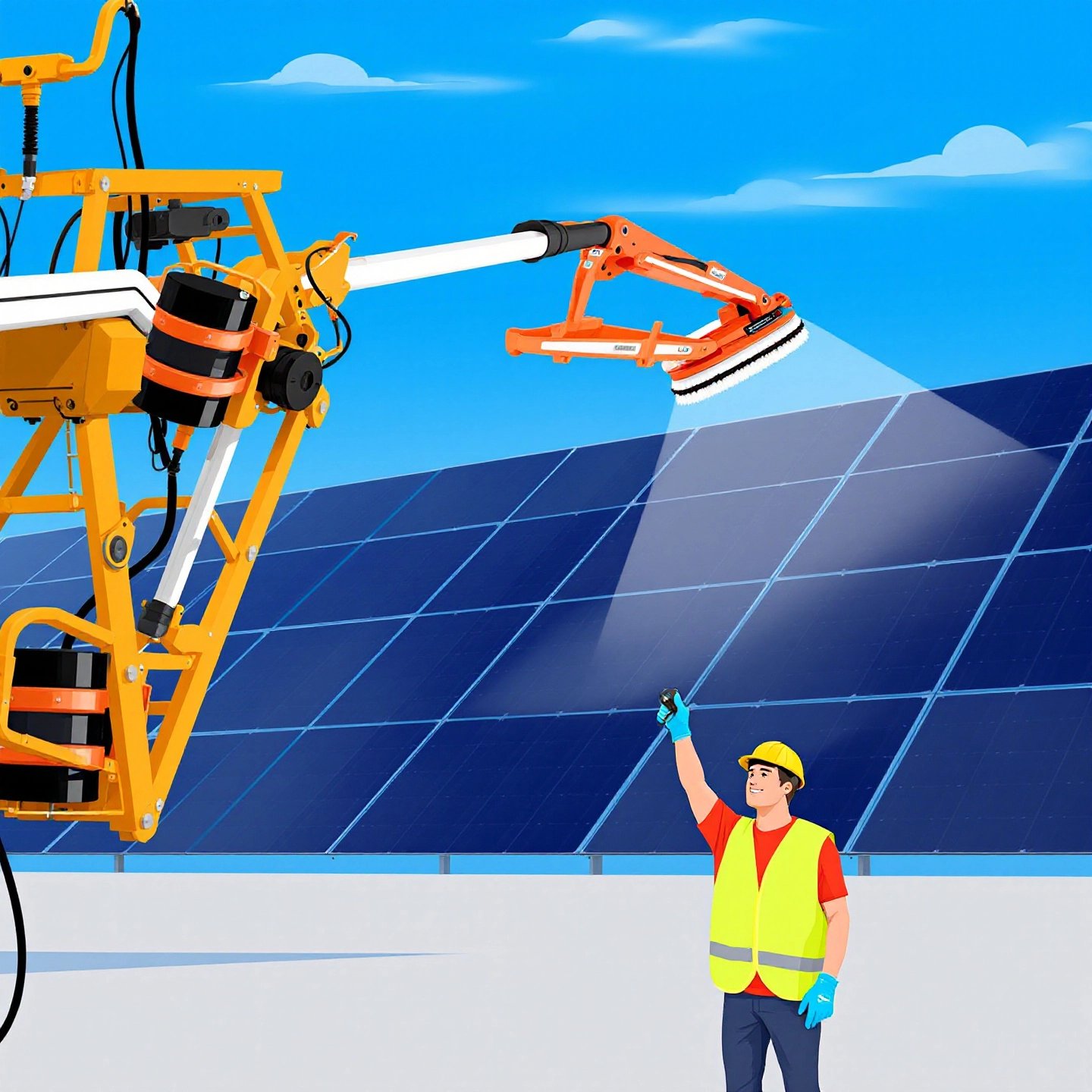
Evaluating Professional Equipment and Techniques for Solar Panel Cleaning
When it comes to maintaining the efficiency of your solar panels, the role of professional solar panel cleaning services cannot be overstated. These experts utilize specialized equipment designed to clean panels thoroughly without causing damage. Let’s delve into the tools and techniques that set professional cleaning services apart from DIY methods.
State-of-the-Art Cleaning Equipment
Professional solar panel cleaners use advanced tools that ensure effective cleaning while protecting the delicate surfaces of the panels. For instance, companies like Solar Clean Techs offer German-made Sola-Tecs equipment, renowned for its efficiency and safety. These include rotating brushes and telescopic poles that can reach high installations without risking damage. The use of purified water systems is another hallmark of professional services, as they prevent mineral deposits and streaks that tap water might leave behind.
Techniques for Optimal Cleaning
Professionals employ techniques that maximize cleaning efficiency and panel performance. They often start with a gentle rinse to remove loose debris, followed by a thorough scrub using soft brushes that avoid scratching the panel surface. The process concludes with a final rinse using deionized water, ensuring no residue is left that could impede sunlight absorption. This meticulous approach not only cleans but also helps identify potential issues such as micro-cracks or loose wiring.
Renewable Energy Nexus: Your Partner in Solar Solutions
For those seeking to enhance their solar panel maintenance, Renewable Energy Nexus offers comprehensive solutions. Their solar kits are compatible with recommended cleaning tools, providing a seamless integration for maintaining your panels. Whether you’re a homeowner or managing a commercial installation, their range of solar products and expert guidance ensures your panels remain in top condition, enhancing both efficiency and longevity.
Incorporating professional cleaning services and equipment into your solar panel maintenance routine is a wise investment. It not only preserves the functionality of your panels but also ensures they deliver optimal energy output. As we move forward, consider establishing a long-term maintenance schedule to keep your solar panels performing at their best.
Establishing a Long-Term Maintenance Schedule for Solar Panels
Planning a solar panel maintenance schedule is key to ensuring your system operates at peak efficiency throughout its lifespan. Imagine your solar panels as a car: regular check-ups and cleanings keep them running smoothly. But how do you determine the right schedule? It largely depends on your regional conditions and the specific environment of your panels.
Tailoring Your Schedule to Regional Conditions
Location plays a significant role in determining how often your panels need attention. For instance, if you live in an area with frequent dust storms or high pollen counts, more frequent cleaning will be necessary. Conversely, regions with regular rainfall may naturally keep panels cleaner, reducing the need for frequent maintenance. According to Qcells, scheduling maintenance every three months is generally effective, but this can be adjusted based on local environmental factors.
Monitoring Energy Output
Tracking the energy output of your solar system is crucial for identifying when maintenance is needed. By using monitoring apps, such as the one offered by ION Solar, you can observe any declines in performance that might indicate the need for cleaning or repairs. Regularly comparing energy output before and after cleaning can help you fine-tune your maintenance schedule, ensuring your panels are always performing optimally.
Implementing Preventive Measures
Incorporating preventive measures into your maintenance plan can further enhance the longevity and efficiency of your panels. This includes trimming nearby trees to prevent shading, installing critter guards to keep pests away, and using non-abrasive cleaning tools to avoid scratching the panel surfaces. By proactively addressing potential issues, you ensure long-term solar care and maximize your energy savings.
By establishing a well-structured maintenance schedule tailored to your specific conditions, you’ll not only prolong the life of your solar panels but also ensure they consistently operate at maximum efficiency. Next, we’ll explore the different cleaning methods available, helping you choose the most effective approach for your system.
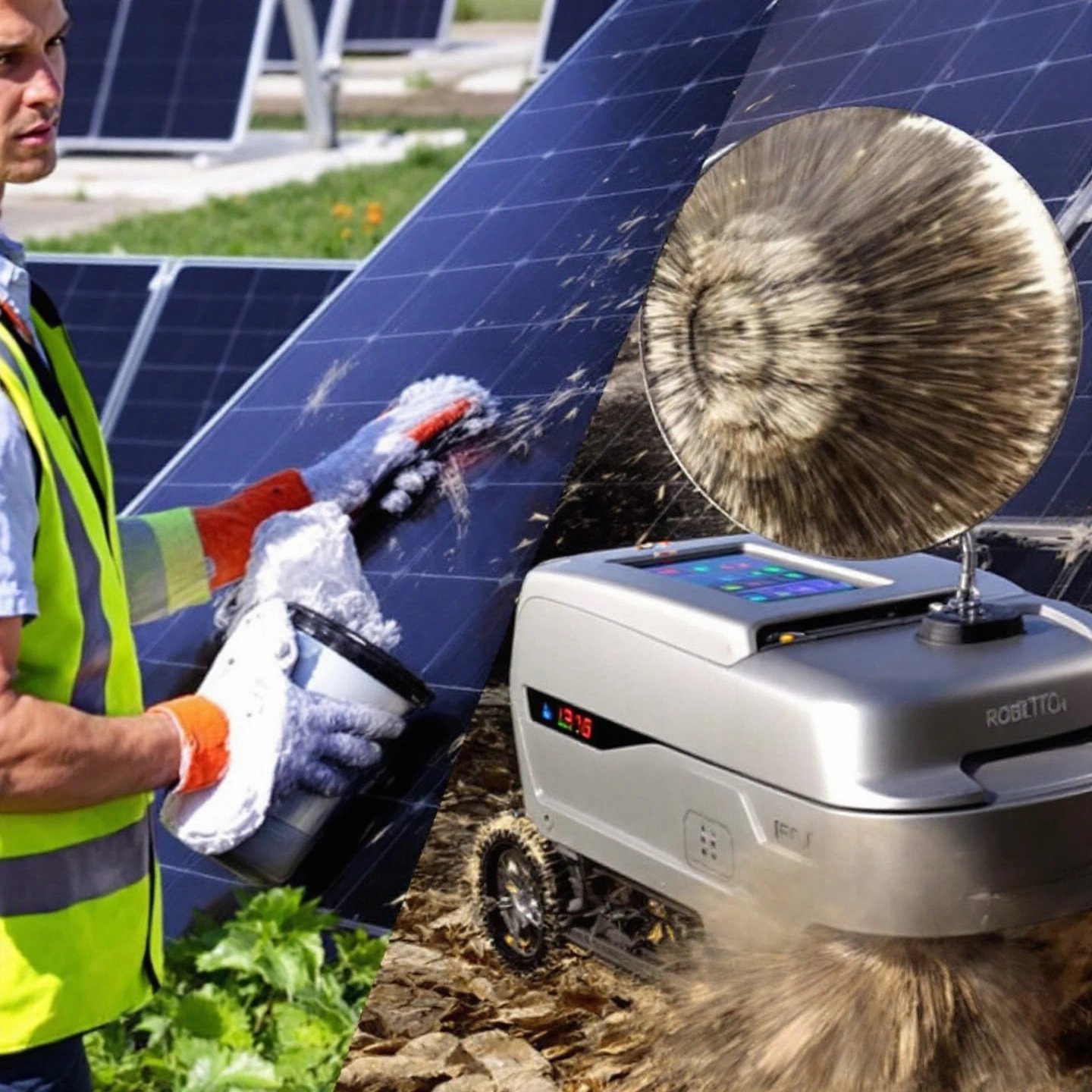
Choosing the Most Effective Cleaning Approach for Your System
When it comes to maintaining your solar panels, selecting the right cleaning method can make a significant difference in their performance and longevity. You might wonder, ‘What’s the best way to clean my solar panels?’ Let’s explore the options between manual vs automated cleaning and how to adapt these methods to different panel technologies.
Manual Cleaning: Precision and Control
Manual cleaning involves using tools like soft brushes, squeegees, and purified water to remove dirt and debris from solar panels. This method is often preferred for its precision and the ability to focus on areas that need extra attention. As highlighted by Solar Power World, manual cleaning can be more thorough, especially in removing stubborn grime or bird droppings that might not be effectively handled by automated systems. This approach is particularly beneficial for residential systems or small commercial installations where access is relatively easy.
Automated Solutions: Efficiency and Consistency
On the other hand, automated cleaning systems, such as robotic cleaners, offer efficiency and consistency. These systems are designed to clean panels without direct human intervention, making them ideal for large-scale commercial installations. According to RatedPower, automated solutions can perform regular cleanings, ensuring panels remain free of dust and debris, which can significantly impact energy production. Robotic cleaners are particularly effective in environments with frequent dust storms or where manual cleaning would be labor-intensive and costly.
Adapting Strategies for Different Technologies
When choosing between manual and automated cleaning, consider the type of solar panels you have. Traditional silicon panels might benefit from either method, but advanced technologies like bifacial panels, which capture sunlight from both sides, may require more sophisticated cleaning strategies to maintain their dual-surface efficiency. Additionally, the location and environmental conditions play a crucial role. For instance, areas prone to heavy pollution or frequent bird activity might necessitate more frequent manual cleanings or the installation of a robotic system for continuous maintenance.
Incorporating the right cleaning approach ensures that your solar panels operate at peak efficiency, maximizing their energy output and lifespan. As we conclude this exploration of cleaning methods, remember that choosing the right strategy depends on your specific needs and conditions. The next step is to integrate these insights into a comprehensive maintenance plan that keeps your solar panels performing optimally year-round.
Conclusion: Maximizing Benefits Through Efficient Solar Panel Maintenance
As we’ve explored, regular maintenance is key to unlocking the full potential of your solar investment. The solar panel cleaning benefits are clear: improved energy output, prolonged lifespan, and protection against costly repairs. Systematic cleaning not only enhances efficiency but also ensures your panels continue to contribute to sustainable energy goals.
Imagine the peace of mind knowing your solar panels are operating at peak performance. By incorporating an efficient solar panel maintenance routine, you can achieve this. Regular inspections and cleanings prevent the accumulation of dirt and debris that can reduce energy production by up to 30% (Arka360). This proactive approach not only maximizes energy savings but also safeguards your investment against potential damage.
Furthermore, engaging professional services like those offered by Renewable Energy Nexus ensures your panels receive expert care. Their comprehensive solutions cater to both residential and commercial needs, providing tailored products and guidance to optimize your solar system’s performance. By choosing a trusted provider, you ensure that your panels are maintained with the latest techniques and equipment, enhancing their efficiency and longevity.
In conclusion, the commitment to regular maintenance and professional assistance is a small step that yields significant returns. By keeping your solar panels clean and well-maintained, you not only boost their efficiency but also contribute to a cleaner, more sustainable future. Explore the resources and products offered by Renewable Energy Nexus to further enhance your solar journey and ensure your panels continue to serve you effectively for years to come.
Frequently Asked Questions
1. Is it worth it to get your solar panels cleaned?
Yes, cleaning solar panels can significantly boost their efficiency, especially in dusty or polluted areas. Regular cleaning prevents dirt buildup, ensuring panels absorb maximum sunlight for optimal energy production.
2. How much does it cost to clean solar panels?
The cost of cleaning solar panels typically ranges from $100 to $300, depending on the number of panels and location. Regular maintenance can prevent efficiency losses and extend panel lifespan.
3. How frequently should solar panels be cleaned?
Solar panels should be cleaned at least once a year, but more frequent cleaning may be necessary in dusty or polluted areas to maintain optimal energy output.
4. How do I find a local solar panel cleaning service?
Search online for local providers, verify their credentials, read customer reviews, and schedule site assessments to find a reliable solar panel cleaning service near you.
5. What are the benefits of professional solar panel cleaning services?
Professional services use specialized equipment to clean panels thoroughly without damage, enhancing energy efficiency and identifying potential issues early.

